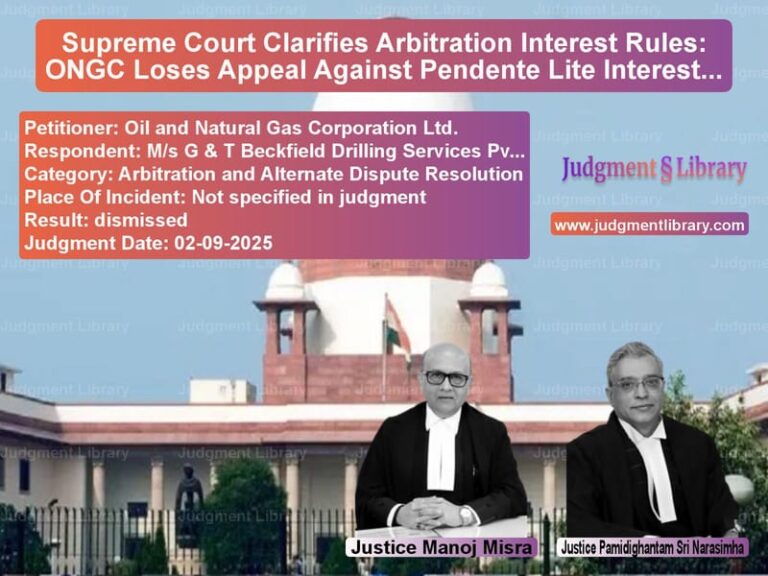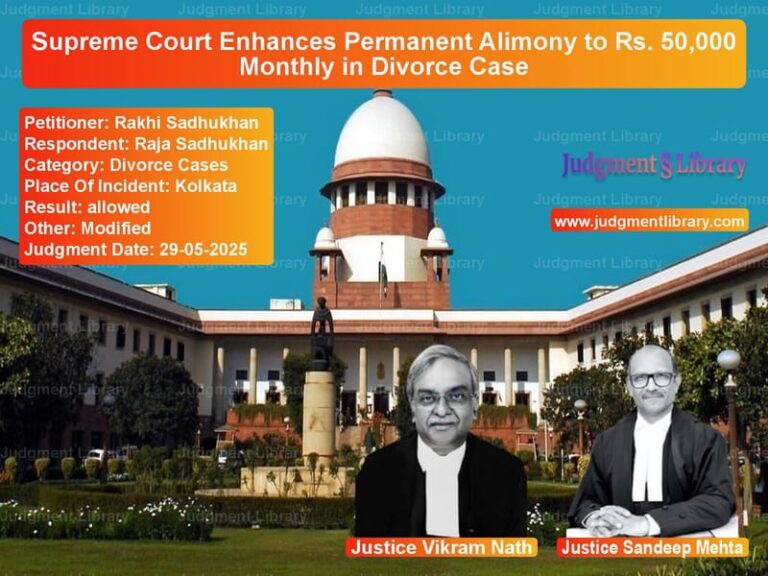Delhi Development Authority v. Kram Singh: Supreme Court Ruling on Land Acquisition
The case of Delhi Development Authority v. Kram Singh & Ors. revolves around a dispute concerning land acquisition under the Right to Fair Compensation and Transparency in Land Acquisition, Rehabilitation and Resettlement Act, 2013. The Supreme Court ruled that the appellant, Delhi Development Authority (DDA), must either initiate fresh acquisition proceedings within a specified period or return the land to its original owner. This judgment emphasizes the importance of procedural compliance in land acquisition matters.
Background of the Case
The appellant, Delhi Development Authority (DDA), had acquired land under previous land acquisition laws. However, the respondents, Kram Singh and others, challenged the acquisition, arguing that it was not carried out in accordance with the provisions of the 2013 Land Acquisition Act.
The respondents contended that they were entitled to relief under Section 24(2) of the 2013 Act, which allows for the lapse of land acquisition proceedings if possession has not been taken or compensation has not been paid. The case was brought before the Supreme Court after lower courts ruled in favor of the landowners.
Arguments of the Petitioner
The Delhi Development Authority presented the following arguments:
- The land acquisition had been initiated lawfully, and the respondents had no grounds to challenge it.
- The 2013 Land Acquisition Act should not apply retroactively to acquisitions that were substantially completed under previous laws.
- The government had already taken possession of the land, and the respondents were not entitled to reclaim it.
Arguments of the Respondent
The respondents, Kram Singh and others, argued:
- The acquisition proceedings had lapsed under Section 24(2) of the 2013 Act since possession was not taken, and compensation was not paid.
- The Supreme Court had previously ruled in similar cases that such acquisitions must be annulled if they did not comply with the 2013 Act.
- Their land should be returned to them as per the law.
Supreme Court’s Observations and Judgment
A bench comprising Justices Kurian Joseph and Rohinton Fali Nariman ruled against the appellant, Delhi Development Authority, citing precedents in similar cases. The Court upheld the rights of the respondents under the 2013 Act.
Key Observations
- The Supreme Court had already decided similar cases, setting a precedent that applied to this case as well.
- The appellant was given one year to initiate fresh acquisition proceedings if they wished to retain the land.
- If fresh acquisition proceedings were not initiated within a year, the land must be returned to the original landowners.
Excerpts from the Judgment
The Supreme Court ruled:
“The issue, in principle, is covered against the appellant by judgments in Civil Appeal No. 8477 of 2016 and Civil Appeal No. 5811 of 2015.”
It further directed:
“In case no fresh acquisition proceedings are initiated within the said period of one year from today by issuing a Notification under Section 11 of the Act, the appellant, if in possession, shall return the physical possession of the land to the original landowner.”
Legal Implications
This ruling has several legal consequences:
- Government agencies must comply with the provisions of the 2013 Land Acquisition Act.
- Land acquisition proceedings initiated under previous laws are subject to review under the new legal framework.
- Failure to follow proper procedures may result in land being returned to its original owners.
Impact of the Judgment
The Supreme Court’s ruling has a significant impact:
- It reinforces landowners’ rights under the 2013 Act.
- It requires government agencies to act within specified timelines to complete land acquisitions.
- It prevents arbitrary land acquisitions without due process.
Comparison with Previous Rulings
This judgment aligns with earlier Supreme Court decisions, where land acquisitions were annulled due to non-compliance with the 2013 Act. It upholds the principle that landowners should not suffer due to bureaucratic delays.
Conclusion
The Supreme Court’s decision in Delhi Development Authority v. Kram Singh & Ors. ensures that land acquisition laws are applied fairly. By giving the appellant one year to initiate fresh acquisition proceedings, the Court balanced the interests of both parties while upholding legal precedent.
Don’t miss out on the full details! Download the complete judgment in PDF format below and gain valuable insights instantly!
Download Judgment: Delhi Development Au vs Kram Singh & Ors. Supreme Court of India Judgment Dated 23-09-2016-1741883906940.pdf
Direct Downlaod Judgment: Direct downlaod this Judgment
See all petitions in Property Disputes
See all petitions in Landlord-Tenant Disputes
See all petitions in Judgment by Kurian Joseph
See all petitions in Judgment by Rohinton Fali Nariman
See all petitions in dismissed
See all petitions in Remanded
See all petitions in supreme court of India judgments September 2016
See all petitions in 2016 judgments
See all posts in Civil Cases Category
See all allowed petitions in Civil Cases Category
See all Dismissed petitions in Civil Cases Category
See all partially allowed petitions in Civil Cases Category







